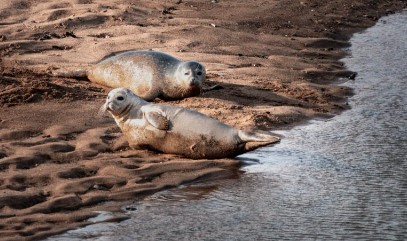PD Ports, the Tees and Hartlepool port authority, have signed over a 30-year lease for the old lifeboat station at South Gare, Redcar, to Teesmouth Seal Conservation Trust (TSCT), a brand-new charity set up to help with the rescue and rehabilitation of seals around the Tees Estuary.
The lease agreed with PD Ports – set at a token £100 a year – will see the unused lifeboat building repurposed to create the Teesmouth Seal Rescue and Coastal Conservation Centre – the first dedicated welfare and rehabilitation facility for seals and coastal conservation in the Tees region.
The return of harbour seals to the Tees in the 1980s was hailed as a great environmental success story after they became extinct there through the worst years of river pollution. Today, the population, monitored by the Industry and Nature Conservation Association (INCA), is almost 200 strong with 36 pups being born in 2022.

Despite their return to the Tees, the seals are vulnerable to disease, pups being separated from their mothers, attacks by dogs on beaches, entanglement in fishing gear, starvation and other hazards. In particular, the harbour seals in the Tees have been blighted by a disease known as mouth rot, which also plagues other harbour seal colonies on the UK’s North Sea coast.
A new charity – Teesmouth Seal Conservation Trust – has been set up specifically to provide help for the important population of seals living in and around the Tees Estuary, providing care and welfare work to sick, orphaned, and injured seals with help from public donations, grants, and contributions from industry. The new organisation is already working with Teesside University, local vets, and British Divers Marine Life Rescue (BDMLR) to try to find the best ways to manage and understand mouth rot disease. TSCT expects its members could be called upon to rehabilitate as many as 30 local seals a year at the new South Gare conservation facility.
David Newell, chairman of TSCT, said: “The main purpose of the building will be as a seal hospital to provide rehabilitation for seals, often pups, that have been found in distress. We have the expertise and connections to the wider seal rescue community to allow us to do this successfully. Once healthy, the seals will be released back into the Tees Estuary. We are enormously grateful for all the help that we have received so far and for this important collaboration with PD Ports. We are confident that public and industry support for our crucial work will continue to grow.”

Seals are marine animals at the top of the coastal food chains. The presence of seals is therefore an indicator of the good health of coastal waters. The fact that seals have returned to Teesside is heartening news.
Frans Calje, chief executive officer of PD Ports, said: “It is very pleasing to see the disused lifeboat station being repurposed to focus on seal and coastal conservation. It seems fitting to us at PD Ports that a building with such a history of coastal rescue should now have a future in rescuing marine animals. As a company operating in such an environmentally sensitive area, we are excited to be providing support for this work through the lease of the old lifeboat station on our private land at the South Gare breakwater, to Teesmouth Seal Conservation Trust.”
The new charity was created with help from Teesside Environmental Trust (TET).
Trust chairman David Kitchen said: “We received a presentation from seal enthusiast Daniel Fox, and we quickly saw that there was a problem with the Teesmouth seals, particularly in the face of the terrible mouth rot disease. It became TET’s ambition to help and so we have seed-funded the formation of Teesmouth Seal Conservation Trust. This new charity has, as its core mission, the care of the Teesmouth seals and will become an important organisation giving help to seals close to their point of need. I am pleased to see that Daniel now is one of its founding trustees.”
Teesmouth and the surrounding coastline boasts one of the highest levels of inshore wildlife protection anywhere in the UK. TSCT has moved to address concerns raised from the Tees fishing industry that the seal population will grow so large that they will eat local fish stocks.
The new facility at South Gare will include a meeting room, which will be made available as a place where organisations and local groups with an interest in wildlife conservation can meet and network. The new charity will now begin fundraising efforts to establish the seal hospital at South Gare.






